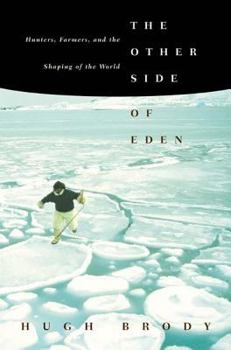The Other Side of Eden: Hunters, Farmers, and the Shaping of the World
Select Format
Select Condition 
Book Overview
Part memoir, part adventure story, part intellectual voyage, The Other Side of Eden begins in the High Arctic of the 1970s. This was where Hugh Brody first lived with hunting peoples and where, as he... This description may be from another edition of this product.
Format:Paperback
Language:English
ISBN:0865476381
ISBN13:9780865476387
Release Date:April 2002
Publisher:Farrar, Strauss & Giroux-3pl
Length:384 Pages
Weight:1.05 lbs.
Dimensions:1.2" x 6.0" x 9.0"
Customer Reviews
4 ratings
Language as culture - not just hunting and gathering
Published by Thriftbooks.com User , 16 years ago
This was a great book. I bought it for $.99 at a local bookstore and was pleasantly surprised by the hours of insightful enjoyment I got out of it. This book is not just about hunter-gatherers versus farmers. While it is true, many of the stories relate back to this, it is not the only or even the most important theme of the book. The other side of Eden explores how language is embedded with culture. It describes in a colorful and easy to understand way how language is used to depict everything from one's surroundings to the very values held within society. The commentary was brought to life in the first part of the book, which is essentially a travel memoir into the rarely seen world of the Inuit. While the last third of the book was a bit academic and the summary felt like an overly beaten summary, this is still a great read. I would recommend this book for anyone who finds language fascinating and who is looking for yet another culture to explore.
A superbly presented, anthropological study
Published by Thriftbooks.com User , 21 years ago
The Other Side Of Eden: Hunters, Farmers, And The Shaping Of The World by anthropologist and documentary filmmaker Hugh Brody is a meticulously researched, superbly presented, anthropological study that looks closely at the life of hunter-gatherers in prehistory. Comparing the hunter-gatherers to farmers, Brody persuasively proposes that it was the farmers and colonizers who were the true nomads, whereas the hunter-gatherers adapted a strong attachment and sense of place to their lands. The Other Side Of Eden is a simply fascinating, iconoclastic, thought-provoking, highly recommended study re-examining long-standing anthropological beliefs about the nature of early human life.
a part of everyone's education!
Published by Thriftbooks.com User , 22 years ago
Hugh Brody is an anthropologist & documentary filmmaker who has worked and traveled extensively among indigenous peoples. He has spent nearly three decades studying, learning from, crusading for, & thinking about hunter-gatherers, who survive at the margins of the vast, fertile lands occupied by farming peoples & their descendants, now the great majority of the world's population.That said be ready to take off for faraway places, ideas & behaviors! The hunters have been all but vanquished, yet in this profound and passionate book, Brody dispels the notion that theirs is a lesser way of life, & reveals the systems of thought, belief, & practice that distinguish them from the farmers. The hunters' deep attachment to the places & ways of their ancestors stems from an enviable sense that they are part of a web of relationships in the natural & spiritual worlds. Brody's aim is not to elevate one mode of being over another, but to suggest that we move beyond dichotomies & accept that there are various ways of being fully human. "The Other Side of Eden" is an exciting, generally well-written saga of the dreams & accomplishments of a dying culture, & as such should be part of everyone's education.
In praise of the road less travelled
Published by Thriftbooks.com User , 23 years ago
The road less travelled in this case is that of hunter gatherers. in a world presently dominated by agriculturalists (that's us), it's easy to overlook the lives and cultures of hunters and gatherers. When we do think of them, there's a tendency to triumphalism - a sense of inevitability about the rise of the farmers, and a sense that agriculture is simply superior.Anthropologist Hugh Brody's newest book is an antidote to all that. Without sentimentalising or romanticising them, Brody describes with the utmost sensitivity the lives of the Innu and Inuit he has lived among during his significant career.He challenges with fairly hard evidence the view that hunter-gatherer cultures are necessarily destined to become agricultural, and that population pressure makes this shift inevitable. He calls us to examine our prejudices - just think of how we use the terms 'civilised' and 'uncivilised' and the implications of this for the latter group.His main hypothesis is that we cannot know what it is to be human unless we take seriously the 'alternative' world of hunter-gatherers. For Brody, theirs is in no sense an 'inferior' culture, but a series of cultures of infinite richness and vitality. Moreover, many of the virtues of agricultural society can be regarded as the merest vestiges of much older qualities, dependent on our hunting and gathering origins.Brody's argument, the point at which he becomes polemical, is hinted at in the sub-title of the book, 'Hunters, Farmers and the Shaping of the World'. Brody holds that farmers have shaped the world we have inherited, largely at the expense of hunters, who have been disposessed, re-educated and exterminated, often 'for their own good'. While it may not be possible to turn back the clock, we can at least examine what is happening in the here and now, rather than dismissing it as the march of progress. The litany of misdeeds recorded by Brody is painful but necessary. Because the process he decries is even now continuing, Brody's book is essential reading.




